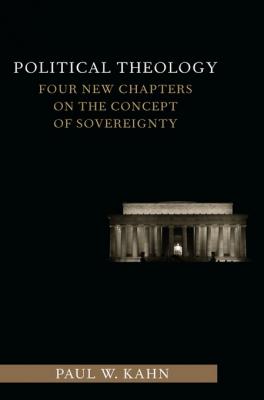Over the coming weeks, The Immanent Frame will host a discussion of Paul W. Kahn’s recent book Political Theology: Four New Chapters on the Concept of Sovereignty. What follows is an excerpt from the Introduction, published with the permission of Columbia University Press. An extensive summary of the text, by Kahn himself, was published at ROROTOKO in April.—Ed.
 To think that organized religions make a complete claim to the sacred—that is, claims title to all that is sacred—is to confuse legal categories with political phenomenology. It is an accident of history that the struggle of the state to free itself of the church was framed not as a conflict of faiths but as a conflict over the place of faith in the organization of political power. In part, this was a consequence of organized religion’s tendency to side with conservative political forces. In part, it was because these political revolutions began two hundred years after the Reformation, which did indeed use the language of the sacred against the established Church. When modern revolutionaries took up the task of translating the felt meaning of political revolution into a constitutional order of law, they thought of themselves as men of the Enlightenment using the language of reason to push religion out of the public sphere. This hardly means that they neither experienced nor relied upon the sacred. In Arendt’s classic analysis, they began by demanding legal rights but ended with an experience of the absolute character of public action. Rights as a means to private ends became a lesser theme to the experience of a kind of transcendent meaning in and through political engagement. In a crisis, it remains true today that the secular state does not hesitate to speak of sacrifice, patriotism, nationalism, and homeland in the language of the sacred. The state’s territory becomes consecrated ground, its history a sacred duty to maintain, its flag something to die for. None of this has much to do with the secular; these are matters of faith, not reason.
To think that organized religions make a complete claim to the sacred—that is, claims title to all that is sacred—is to confuse legal categories with political phenomenology. It is an accident of history that the struggle of the state to free itself of the church was framed not as a conflict of faiths but as a conflict over the place of faith in the organization of political power. In part, this was a consequence of organized religion’s tendency to side with conservative political forces. In part, it was because these political revolutions began two hundred years after the Reformation, which did indeed use the language of the sacred against the established Church. When modern revolutionaries took up the task of translating the felt meaning of political revolution into a constitutional order of law, they thought of themselves as men of the Enlightenment using the language of reason to push religion out of the public sphere. This hardly means that they neither experienced nor relied upon the sacred. In Arendt’s classic analysis, they began by demanding legal rights but ended with an experience of the absolute character of public action. Rights as a means to private ends became a lesser theme to the experience of a kind of transcendent meaning in and through political engagement. In a crisis, it remains true today that the secular state does not hesitate to speak of sacrifice, patriotism, nationalism, and homeland in the language of the sacred. The state’s territory becomes consecrated ground, its history a sacred duty to maintain, its flag something to die for. None of this has much to do with the secular; these are matters of faith, not reason.
The great separation of church and state was intended to place religion squarely within the private domain, outside of the public order of the state. Some supported this position on the grounds that it was good for faith, others on the grounds that it was good for the state, and some on both grounds. Some of our most troubling issues today arise from the crossing of this line of separation, for example, debates over the legal status of abortion or of gay marriage. These debates show us the porousness of the line, for the values we bring to public debate will inevitably reflect our basic beliefs about what it is we owe each other. Those beliefs come from all of our experience, including the ethical practices of our religious faiths. Such tensions are something we all understand. Coming from a religious tradition of monotheism, however, it is much harder to understand a multiplicity of forms of the sacred. Indeed, to speak the language of the sacred about the state suggests not just a violation of the public/private divide, but to many it also suggests a practice of idolatry. Both the religious person and the secularist may agree that they want no gods in the public space: the former because there is only one god, the latter because there are no gods.
Political theology recognizes a multiplicity of forms of the sacred. If sovereignty is grounded in sacrifice, then public life is as much about the realization of a transcendent truth of the self as it is about the maintenance of a just legal order. Political theology, unsurprisingly, has no place in the liberal conception of the state, which begins with Lilla’s great separation not as a historical fact but as a philosophical premise. This difference at the level of theory, however, does not necessarily produce any tension between political theology and the political practices of liberalism. If the political order maintains both an idea of the sacred and an idea of justice, of sovereignty and law, then the point of political theology is not to undermine a particular concept of justice but to expand the horizon within which we understand the operation of the political imagination. Liberal politics may strive to achieve a defensible idea of justice, even as liberal theory fails as an explanation of the source and character of political experience.
The interesting way in which Schmitt was against liberalism had nothing to do with his personal political beliefs and practices, which were indeed antiliberal. Rather, his theory of the political denies the fundamental premises of liberal political theory. This is an argument over the nature of political experience, not over what we should or should not do within the polity. Although Schmitt may not have thought so, one can be liberal in one’s personal political values and practices and still think that we need a theological account of political experience. This is no more difficult than practicing a politics of liberalism while recognizing the importance of revolution to the normative—and historical—foundation of the state. There is nothing liberal about revolution. The relationships at stake here are the political form of that which appears to the individual as the relationship of love to justice. The objects of our love do not earn our affection because they are just, but that does not make us indifferent to justice. We love our children and, therefore, we want them to be just. But we do not abandon our love if they act unjustly.
If we view politics through the lens of contemporary, liberal theory, we will misapprehend the nature of political experience and the meanings that citizens realize in and through their political identities. Elements of political experience grounded in faith and sacrifice will be ignored. We will always be surprised by the violence of which the state—even the liberal state—is capable. Liberalism as a theory of the political fails when political practice turns to killing and being killed, whether that violence is turned inward in the form of revolution or outward in the form of war. We will dismiss the high political rhetoric of sacrifice as dangerous, because it is unreasonable. But only according to liberal theory must the state be a “reasonable” enterprise. Political theology reminds us that apart from reason there remains faith—dangerous as that might be.
Political theology, as I pursue it here, is a project of descriptive political analysis. We are well past the era in which theology could draw upon reason to support the sacred. Indeed, that separation of reason from revelation may be a more important “great separation” than that of which Lilla writes. We will not be convinced by any logical arguments for the existence of God, whether the god of politics or that of religion. Theological inquiry today can only be a practice of phenomenology: to identify and describe the presence of the sacred, wherever it appears.
Political theology gains its critical edge when we juxtapose the products of that phenomenological inquiry to the constructions of liberal political theory. At stake is our understanding of the social imaginary by which we frame our world. There is nothing wrong with setting oneself against the values that are revealed in this account. We are not bound to our political experience as we are bound to the experience of the senses. Understanding the power of the nation does not make me a willing recruit. But unless one begins with an understanding of the character of the social imaginary, one’s oppositional political practices are likely simply to miss their targets. Just as no one will be convinced by argument to believe in God, no faith was ever defeated by argument alone. The ground of faith is in the experience of the sacred, and this works quite independently of reason.
Political theology today is best thought of as an effort to describe the social imaginary of the political. It proceeds at the intersection of constitutional law, cultural anthropology, theology, and philosophy. The inquiry is not to take us back to premodern forms of religious influence on political order, but to the discovery of the persistence of forms of the sacred in a world that no longer relies upon God. Political theology argues that secularization, as the displacement of the sacred from the world of experience, never won, even though the church may have lost. The politics of the modern nation-state indeed rejected the church but simultaneously offered a new site of sacred experience.
By describing his work as theological, Schmitt suggests that the stakes involved are existential and phenomenological. Meaning, not efficiency—experience, not justice—is the issue. While he would no doubt vigorously object to the comparison, he is in some respects not so distant from that other existential explorer of the soul, Sigmund Freud. Both saw a culture desperately looking for possible sources of meaning in the face of a modern crisis of faith. Both doubted the capacity of reason to exhaust the sources of meaning that structure a human life. Schmitt, the constitutional lawyer, differed not so much in his concerns, as in the direction of his inquiry. For him, it was not the individual soul but the soul of the polity—of man in his political, rather than his psychological, aspect—that was the object of inquiry.
Schmitt’s work invites us to develop a political theology for our time. We must pierce the state’s self-presentation as an efficient means of justly advancing individual welfare and look to the experience of the political. Metaphorically, when we put the modern state on the couch, we find a social organism that is simultaneously deeply in fear of its own death (the existential crisis) and in deep denial of the fact that it is willing to do anything at all to put off that death (liberal theory). Looking into the soul of the modern welfare state, we can still see the mysterium tremendum of the sacred, with its tremendous power for both destruction and construction.
This work must be responsive to the particular conditions of an American superpower that simultaneously asks its young people to take up the political burden of sacrifice in the war on terror and seeks to affirm its belief in the rule of law. Many of our deepest conflicts—practically and conceptually—emerge out of this double commitment to a practice of political sacrifice and a practice of law. A sense that something has gone awry was expressed in the repeated critique that the Bush Administration did not ask the nation as a whole to take up the burden of sacrifice. We simultaneously condemned the war in Iraq as mistaken but felt that we should all be sacrificing more for the larger war on terrorism. Dissatisfied as we may be with that war, the problem is not that the nation will no longer respond to a call for sacrifice.
While liberal theory has given us tools to understand the rule of law, it has pushed out of sight the meaning of political sacrifice. To understand the latter, we must turn to something like Schmitt’s ideas of exception and decision. If we imagine the decision as the result of a logical deduction, we will never leave law and liberal theory. The decision that is the act of giving up the self is never the result of logic. It is an existential choice to be—or literally not to be. We can study liberal political theory a very long time and never find this existential moment of self-sacrifice. We can turn from theory to law and still not see the plainest facts of our political life. If politics remains even in part a practice of sacrifice, then we must follow Schmitt into the domain of the theological.
Excerpted from Political Theology: Four New Chapters on the Concept of Sovereignty by Paul Kahn. Copyright (c) 2011 Columbia University Press. Used by arrangement with the publisher. All rights reserved.
***













